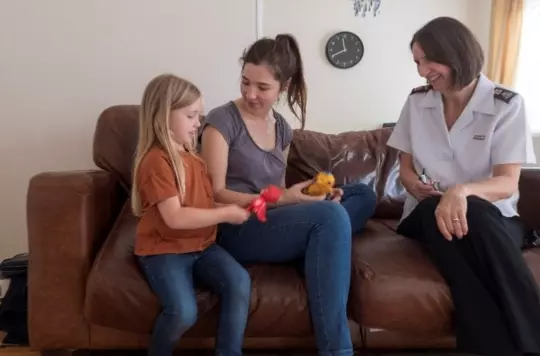A homeless patient attends hospital every seven minutes
published on 28 Jun 2023

Over 78,000 hospital visits were recorded in England in the last year from patients of 'no fixed abode'*, one every seven minutes, according to new research from The Salvation Army. That's a rise of 37 per cent in four years, in stark contrast to the 0.1 per cent drop for the general population.
The church and charity is calling for urgent action to help protect vulnerable people from the health risks of homelessness, which would also help ease the demand on already stretched hospitals.
A Freedom of Information request from The Salvation Army to NHS Trusts in England revealed that in 2021/2022, there were:
- More than 57,500 instances where patients of 'no fixed abode' attended A&E, which is up 33 per cent since 2017/18 and far outstrips the 2.5 per cent rise for the general population.
- More than 21,000 instances where patients of 'no fixed abode' were admitted to hospital, a 60 per cent rise since 2017/18 and a far cry from the 4 per cent decline in admissions for the general population.
- Eleven thousand instances where patients of 'no fixed abode' were admitted to hospital for drug poisoning, nine times more than in 2017/18.
The findings came from 114 NHS Trusts. However, with a quarter of NHS Trusts in England failing to respond to The Salvation Army's request for data**, the true number of homeless patients is expected to be far higher than even these figures show.
"The mental and physical health risks of rough sleeping have been well documented, but these figures also include people who are sofa surfing or living in unsuitable temporary accommodation. We know from our work how people who are homeless often struggle to get a medical diagnosis and treatment before their health problems become dire and they end up in hospital. Being homeless also puts severe pressure on mental health, leading some to use alcohol and drugs to block out the pain of their situation.
“Helping someone overcome the reasons they are homeless is also key to ending the cycle of homelessness and ill health. That means prioritising support and treatment, especially for those with mental health and addiction problems. However, our research also exposed how NHS data relating to homeless patients is not readily available in every local area in England.
"Without this vital information, it’s very difficult for local and national Government to plan and fund support and prevention services that tackle the causes and impact of homelessness. At the Salvation Army, we have seen how the Housing First service, which provides both a stable home and specialist support, has often prevented the health issues of former rough sleepers from escalating and needing hospital treatment.”
JP, aged 40, from Liverpool, had two spells in hospital for respiratory conditions, first while sofa surfing and then when sleeping in a shack he had built under a railway bridge.
He said: “Before I became homeless, I was into sports and did charity boxing matches. Having severe health issues at my age felt like a kick in the teeth and like my life was over”.
"The first time I needed to go to hospital, I'd been sleeping on different people's sofas. When I was discharged with antibiotics and an inhaler, the council's crisis team arranged two nights of emergency accommodation, but after that I was told I wasn't a priority for housing, so I ended up living rough on an old rail track. Smoke from nearby bonfires made my chest hurt, and I sounded like a creaky gate because of all the coughing.
"I felt like I couldn't breathe. I had to be taken by ambulance to hospital, where I stayed for ten days and got diagnosed with COPD, which causes lung damage. I already suffered with my mental health because of my traumatic childhood and losing my dad to a heart attack when I was just 12, so becoming so ill also sent my anxiety through the roof.
"I've no doubt that my mental and physical health conditions were made worse by being homeless. It's hard to see a doctor when you are homeless; you have to use the walk-in health centre instead because you don’t have an address, so you can't register with a GP.
"I finally had a doctor when I got a place at a Salvation Army hostel. I wouldn't be here without the support I got at the hostel. I've not changed my doctor since even when I was lucky enough to move into semi-independent supported accommodation with other former rough sleepers, and that's done me a world of good."
The Salvation Army is calling for:
- NHS England to ensure that all NHS Trusts keep a record of homeless patients who attend A&E or are admitted to hospital.
- Local authorities in England to learn lessons from Wales and Scotland, where people living on the streets are now recognised as a priority for local authority support and accommodation.
- Government funding for homelessness and rough sleeping support to rise in line with inflation so the needs of those who are homeless or at risk of homelessness can be met.
- Addictions and mental health support to be prioritised within national and local government homelessness strategies and spending plans.
*No Fixed Abode' is a category used in many public services to refer to any individual with no fixed address. In many cases, it is accepted as a proxy for homelessness.
** 114 NHS Trusts in England with an A&E department and/or hospital wards responded to a request for data under the Freedom of Information Act. However, 33 Trusts failed to respond, and 54 Trusts responded that the request was irrelevant.

